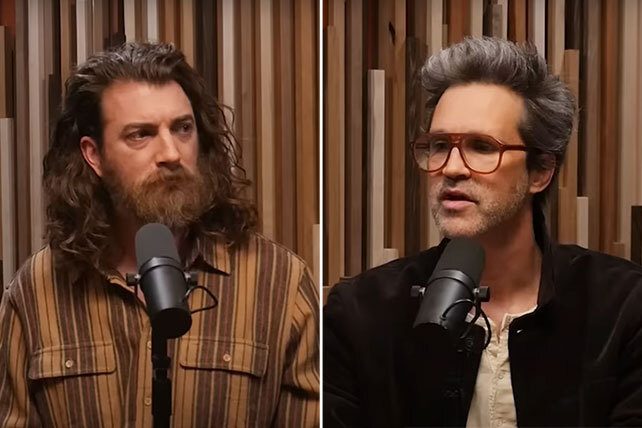Rhett feels like he still has “a vibrant spiritual life.” But instead of having what he would’ve once labeled “communion with God,” he now spends that time in reflection or meditation. About church life, Rhett admitted he misses the community and service aspects, which are two experiences he doesn’t “naturally create for myself.”
Although Rhett said he’d benefit personally from the structure of a church, he doesn’t want the dogma that accompanies it. Link agreed, saying he appreciated the “plug and play” community aspect of a faith body.
RELATED: Phil Wickham Wrote New Single, ‘I Believe,’ With Deconstruction in Mind
Link is happy to talk about his deconstruction experience, he said, but everyone must come to their own conclusions. Debating Christianity is “just not an exchange that I’m interested in,” he noted.
Rhett and Link Answer Questions About Deconstruction
On last week’s podcast, callers indicated they had left religious backgrounds including Southern Baptist, Seventh-day Adventist, and the LDS church. One asked what Rhett and Link use as their “guiding light” in place of the Bible.
RELATED: Southern Baptist Leaders Remain Undaunted As Legal Bills From Abuse Investigation Mount
“My moral compass is the same moral compass that it was when I was a Christian,” Rhett said. “I think your moral compass is something that is inherent to the human experience. I think most moral decisions are made by moral intuition.” He rejected the notion that someone’s moral compass is linked to any particular religious philosophy.
Rhett is “essentially the same person” after deconstructing, he said, with the “same heart and same attitude toward people.” But now he adheres to a “secular humanist moral philosophy,” making decisions based on “what is best for human flourishing” rather than on God dictating certain laws.
Using the example of how the church deals with homosexuality, Rhett said, “Even when I was a Christian, I was really uncomfortable with what I had to believe about gay people [because] it wasn’t consistent with my moral compass.” As an evangelical Christian, “My moral philosophy was in slight conflict with my moral compass.”
When a caller asked Rhett if he still labels himself a “hopeful agnostic,” he said yes:
When I say that I’m agnostic, I’m saying, “I don’t know,” and I’m also saying I’m okay with that. I’m open to knowing, but I find it a little bit interesting that we’ve been around for a long time and there’s been billions of us for hundreds of thousands of years, and nobody’s figured it out yet. That’s why I’m not looking, honestly…I’m not trying to talk you out of it. I’m talking about me. I don’t believe [Christianity], and I’m just as happy. Life is beautiful, life is mysterious, and I am hopeful.

